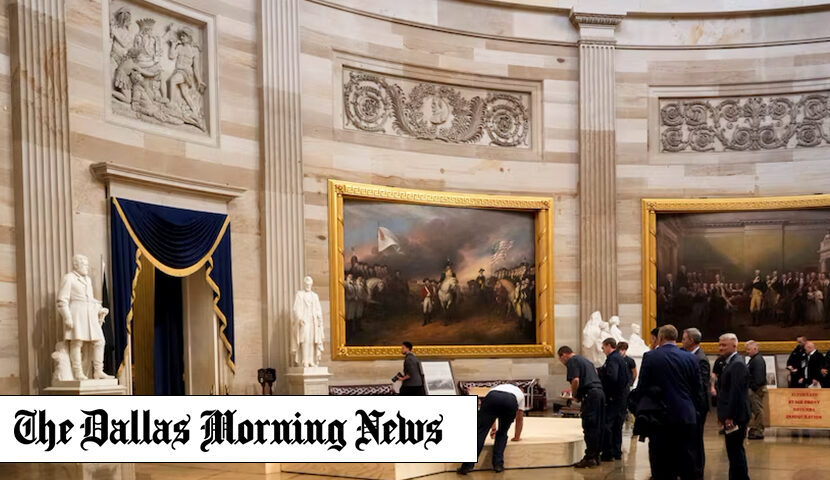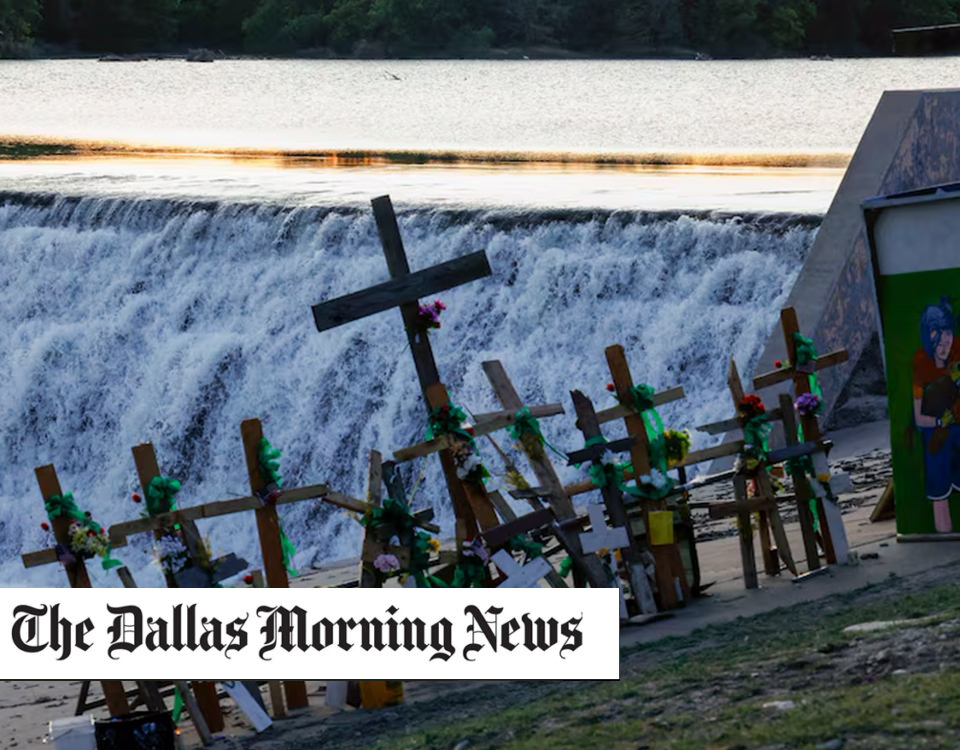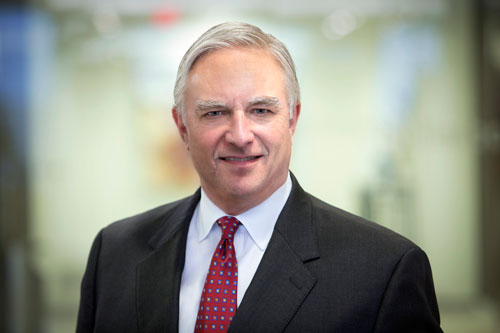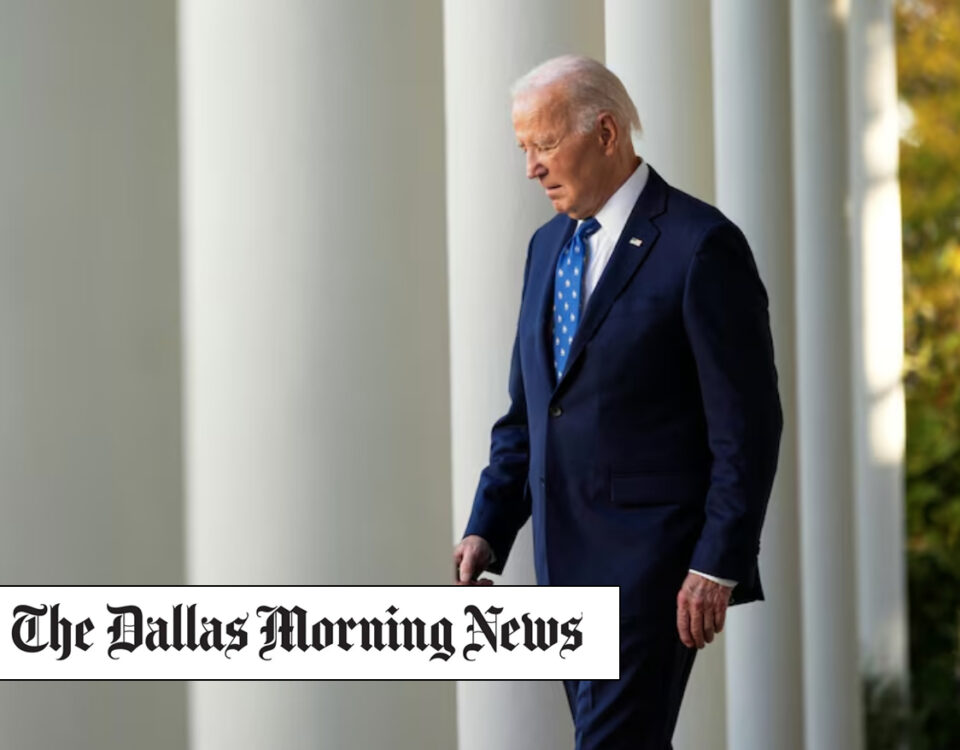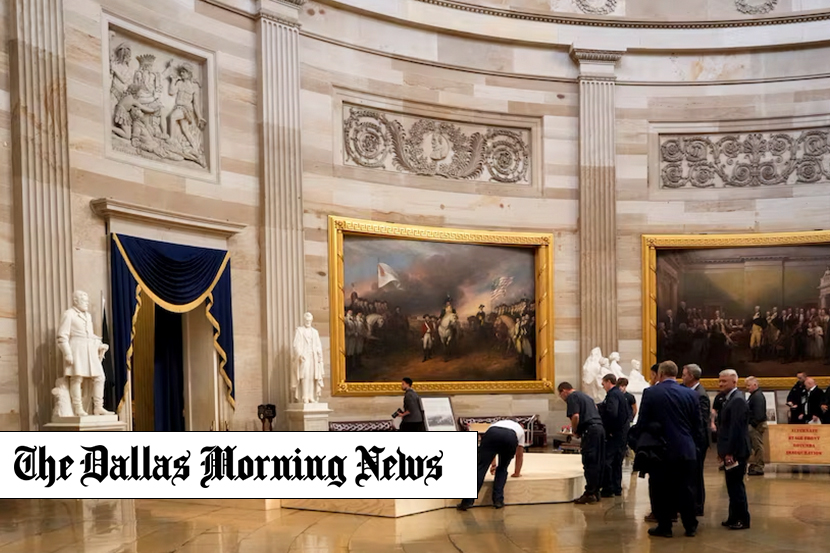
Workers build a stage in the U.S. Capitol Rotunda in Washington Friday, Jan. 17, 2025, for the 60th Presidential Inauguration, which was moved indoors because of cold temperatures expected on Jan 20. (Morry Gash / AP)
Boston: Talk is cheap on the inauguration stage
Our greatest presidents made their promises into reality.
At his inauguration on Jan. 20, 2021, 78-year-old Joe Biden gave a 21-minute speech crafted by a team of speechwriters that included Pulitzer-winning historian Jon Meacham. Biden called for national unity; referenced Abraham Lincoln, Martin Luther King Jr., and Arlington National Cemetery; quoted St. Augustine and the Bible; and ended by asking God to bless America and our troops.
The address had its eloquent moments, though because inauguration speeches have become largely formulaic, it probably could have been written by the use of artificial intelligence.
Later today, Jan. 20, 2025, 78-year-old Donald Trump will give his Second Inaugural Address. Eight years ago, he gave a 1,433-word speech that lasted 16 minutes. In it, he focused on the “American carnage” that he believed had been caused by “a small group of politicians in the nation’s capital” who had ignored “the forgotten men and women of our country,” failed to prioritize the doctrine of “America first,” and lacked “a total allegiance to the United States of America.” He said his presidency would change all that.
Like Biden and most past presidents, Trump ended by saying he would rely on God in his leadership of the nation and claimed his goal would be to achieve national unity.
As we look back at the last eight years and compare the words in the last two inaugural addresses against the deeds that transpired over the course of the two men’s presidencies, some important questions come to mind.
Will Trump suffer cognitive decline between the ages of 78 and 82 as Biden did?
Will Republicans, with their slim majorities in the House and Senate, be able to achieve Trump’s objectives, or will they be so divided, as congressional Democrats were for much of Biden’s presidency, that they can’t achieve their desired agenda?
Will Trump listen to the advice of others during his second term, or will he be a force only unto himself like he was before?
Does the rest of the world have high hopes, complete dread or something in between for how America’s foreign policy will unfold during Trump’s second term?
Strong, hopeful inaugural messages often become empty promises when a president’s performance fails to hit the mark. Not surprisingly, the best remembered phrases from the prior inaugurations have come from our greatest presidents. Why? Because they had the wherewithal to follow through on their opening-bell aspirations, and their speeches were most definitely not formulaic.
George Washington in 1789, speaking to a fragile new nation that sought to establish a better form of government: “The preservation of the sacred fire of liberty and the destiny of the republican model of government are justly considered, perhaps, as deeply, as finally, staked on the experiment entrusted to the hands of the American people.”
Thomas Jefferson in 1801, speaking to a polarized country reeling in the aftermath of the recently expired Sedition Act and a narrow election result that had required six days and 36 ballots in the House of Representatives before it was resolved: “Every difference of opinion is not a difference of principle. We have called by different names brethren of the same principle. We are all Republicans, we are all Federalists.”
Abraham Lincoln in 1861, when seven states had already seceded from the union and a civil war loomed: “We are not enemies, but friends. We must not be enemies. Though passion may have strained, it must not break our bonds of affection. The mystic chords of memory, stretching from every battlefield and patriot grave to every living heart and hearthstone all over this broad land, will yet swell the chorus of the Union, when touched again, as surely they will be, by the better angels of our nature.”
Franklin D. Roosevelt in 1933, speaking at the height of the Great Depression as he planned to implement his New Deal programs: “First of all, let me assert my firm belief that the only thing we have to fear is fear itself.”
John F. Kennedy in 1961, speaking at the height of the Cold War as he planned to move forward with his creation of the Peace Corps in an effort to build American prestige in developing countries: “And so, my fellow Americans, ask not what your country can do for you; ask what you can do for your country.”
The words from history’s inaugural addresses can only have lasting impact when a president does what it takes to fulfill the promises contained in his opening message, as Washington, Jefferson, Lincoln, Roosevelt and Kennedy succeeded in doing.
As with his and Biden’s prior addresses, Trump’s speech today will be praised by many and criticized by many soon after he delivers it. But his ultimate legacy will be judged by history solely on the basis of his deeds.
We welcome your thoughts in a letter to the editor. See the guidelines and submit your letter here. If you have problems with the form, you can submit via email at [email protected]

